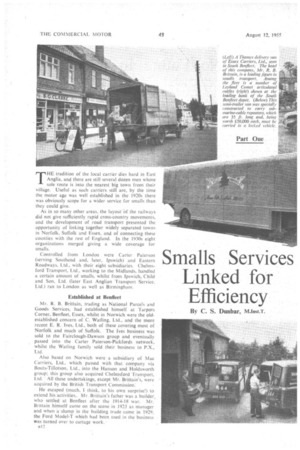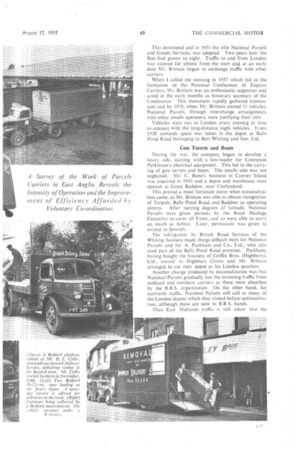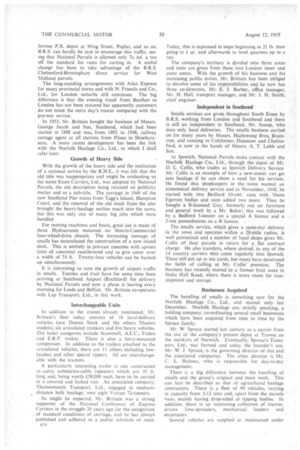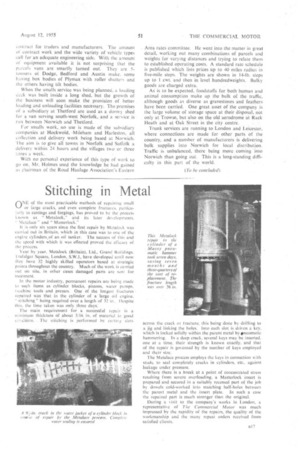Smalls Services Linked for Efficiency
Page 46

Page 47

Page 48

Page 51

If you've noticed an error in this article please click here to report it so we can fix it.
By C. S. Dunbar, M.Inst.T. THE tradition of the local carrier dies hard in East Anglia, and there are still several dozen men whose sole route is into the nearest big town from their village. Useful as such carriers still are, by the time the motor age was well established in the 1920s there was obviously scope for a wider service for smalls than they could give.
As in so many other areas, the layout of the railways did not give sufficiently rapid cross-country movements, and the development of road transport presented the opportunity of linking together widely separated towns in Norfolk. Suffolk and Essex, and of connecting these counties with the rest of England. In the 1930s eight organizations merged giving a wide coverage for smalls.
Controlled from London were Carter Paterson (serving Southend and, later, Ipswich) arid Eastern Roadways, Ltd.. with their eight subsidiaries. Chelmsford Transport, Ltd,. working to the Midlands, handled a certain amount of smalls, whilst from Ipswich, Child and Son, Ltd. (later East Anglian Transport •Service. Ltd.) ran to London as well as Birmingham.
Established at Benfteet Mr. R. B. Brittain, trading as National Parcels and Goods Services, had established himself at Tarpots Corner, Benfleet, Essex, whilst in Norwich were the oldestablished concern of C. Watling, Ltd., and the more recent E. R. Ives, Ltd., both of these covering most of Norfolk and much of Suffolk. The Ives business was sold to the Fairclough-Dawson group and eventually passed into the Carter Paterson-Pickfords network, whilst the Watling family sold their business to P.X., Ltd.
Also based on Norwich were a subsidiary of Mac Carriers, Ltd., which passed with that • company via Bouts-Tillotson, Ltd., into the Hanson and Holdsworth group; this group also acquired Chelmsford Transport, Ltd. • All these undertakings, except Mr. Brittain's, were acquired by the British Transport Commission: He escaped (much, I think, to his own surprise!) tO extend his activities._ Mr. Brittain's father was a builder, who settled at Benfleet after the 1914-18 war. Mr. Brittain himself came on the, scene in 1923 as Manager and when a slump in the building trade •camc in 1929, the Ford Model-T which had been Used, in the business was'turned over to cartage work. This developed and in 1931 the title National. Parcels and Goods Services, was adopted. Two years later the fleet had grown to eight. Traffic to and from London was catered for almost from the start and at an early date Mr. Brittain began to exchange traffic with other carriers.
When I called the meeting in 1937 which led to the formation of the National Conference of Express Carriers, Mr. Brittain was an enthusiastic supporter and acted in the early months as honorary secretary of the . Conference. This movement rapidly gathered momentum and by 1939, when Mr. Brittain owned 1.1 vehicles. National Parcels, through interchange arrangements with other smalls operators, were justifying their title:
. .Vehicles were run to London every evening in time to connect with the long-distance night vehicles. From . 1938 onwards space was taken in the depot at Balls Pond Road belonging to Bert Whiting and Son, Ltd.
• Gun Turrets and Boats During the war, the company began to develop a heavy side, starting with a low-loader for .CrOtnpton Parkinson's electrical equipment. This led to the carrying of gun turrets and boats. The smalls side was not neglected. Mr.C. Bone's business in Canvey Island was acquired in 1943 and a depot and warehouse were opened at Great Baddow, near Chelmsford.
This proved a most fortunate move when nationalization came, as Mr. Brittain was able to obtain recognition of Tarpots, Balls Pond Road and Baddow as operating centres. After -varying degrees of latitude, National Parcels were given permits by the Road Haulage Executive to cover all Essex, and so were able to carry on much as before. Later, permission was given to extend to Ipswich.
The taking-over by British Road Services of the Whiting business made things difficult both for National Parcels and for A. Packham and Co., Ltd., who also used part of the Balls Pond Road premises. Packham, having-bought the business of Griffin Bros. (Highbury), Ltd., moved to Highbury Grove and Mr. Brittain arranged to use their depot as his London quarters.
Another change produced by nationalization was that National Parcels gradually lost the incoming traffic from midland and northern carriers as these were absorbed by .the B.R.S. organization. On the other hand, for outwards traffic, National Parcels still call at many of the London depots which they visited before nationalization, although these are now in B.R.S. hands.
Thus East Midlands traffic is still taken into the former P.X. depot at Ming Street, Poplar, and so on. B.R.S. can hardly be said to encourage this traffic, seeing that National Parcels is allowed only 7s. 6d. a ton off the standard list rates for carting in. A useful change has been to take advantage of the -B.R.S. Chelmsford-Birmingham direct service for West Midland parcels.
The long-standing arrangements with Atlas Express for many provincial towns and with N. Francis and Co., Ltd., for London suburbs still continues. The big difference is that the evening trunk from Bentleet to London has not been restored but apparently customers do not mind the extra day's transit compared with the pre-war service.
In 1953, Mr. Brittain bought the business of Messrs. George Jacob and Son, Southend, which had been started in 1888 and was, from 1892 to 1948, railway cartage agent at all stations from Pitsea to Shoeburyness. A more recent development has been the link with the Norfolk Haulage Co., Ltd., to which I shall refer later.
Growth of Heavy Side •
With the growth of the heavy side and the institution of a national service by the R.H.E., it was felt that the old title was inappropriate and might be misleading so the name Essex Carriers, Ltd., was adopted by National Parcels, the old description being retained on publicity matter and as a sub-title. The carriage in 1949 of the new Southend Pier trains from Tagg's Island, Hampton Court, and the removal of the old stock from the pier brought the heavy-haulage section much into the news, but this was only one of many big jobs which were handled For moving machines and boats, great use is made of three Hydracranes mounted on Morris-Commercial four-wheel-drive chassis. The increasing tonnage of smalls has necessitated the construction of a new island deck. This is entirely in precast concrete with aprons (also of concrete) cantilevered and to give cover over a width of 74 ft. Twenty-four vehicles can be backed up simultaneously.
It is interesting to note the growth of airport traffic in smalls. Textiles and fruit have for some time been arriving at Southend Airport (Rochford) for delivery by National Parcels and now a plane is leaving every morning for Leeds and Belfast. Mr. Brittain co-operates with Lop Transport, Ltd., in this work.
Interchangeable Units In addition to the cranes already mentioned, Mr. Brittain's fleet today consists of 18 local-delivery vehicles (one Dennis Stork and the others Thames models), six articulated trunkers and five heavy vehicles. The latter categories include Scammell, A.E.C., Forlen and E.R.F. makes. There is also a lorry-mounted compressor. In addition to the trailers attached to the articulated vehicles, there are 11 others including lowloaders and other special tippers. All are interchangeable with the tractors.
A particularly interesting trailer is one constructed to .carry submarine-cable repeaters which are 35 ft. long and, being worth £50,000 each, have to be carried in a covered and locked van. An associated company, Thamesmouth Transport. Ltd., engaged in mediumdistance bulk haulage, own eight Vulcan 7-1-tormers. As might be expected, Mr. Brittain was a strong supporter of the National Conference of Express Carriers in the struggle 20 years ago for the recognition of standard conditions of carriage, and he has always published and adhered to a public schedule of rates. 14 Today, this is expressed in steps beginning at 21 lb. then going to 1 qr. and afterwards in level quarters up to a ton, The cOmpany's territory is divided into three areas and rates are given from these into London inner and outer zones. With the growth of his business and his increasing public duties, Mr. Brittain has been obliged to devolve some of his responsibilities and he now has three co-directors, Mr. E. J. Barber, office manager, Mr. H. Hall, transport manager, and Mr. J. H. Smith, chief eng:neer.
Independent in Southend Smalls services are giveh throughout South Essex by B.R.S. working from London and Southend and there is still an independent in Southend, Mr. Jessop, who does only local deliveries. The smalls business carried on for many years by Messrs. Hazlewood Bros, Braintree, and running to Colchester, Dunmow and Chelmsford, is now in the hands of Messrs. A. T. Lobb and Son.
At Jpswich, National Parcels make contact with the Norfolk Haulage Co., Ltd., through the depot of Mr. D. L. Collis, who trades as Ipswich Delivery Service. Mr. Collis is an example of how a new-comer can get into haulage if he can show a need for his services. He found that shopkeepers in the town wanted an economical delivery service and in November, 1948, he started with two Bedford 10-cwt. vans with Mann Egerton bodies and soon added two more. Then he bought a B-licensed. Guy, formerly run on furniture and general work by a Mr. Baker; this was followed by a Bedford 5-tonner on a special A licence and a 3-ton pantechnicon on a B licence.
The smalls service, which gives a same-day delivery in the town and operates within a 20-mile radius, is well patronized and a number of local shops gives Mr. Collis all their parcels in return for a flat contract charge. He also transfers, where desired, to any of the 14 country carriers who come regularly into Ipswich. These still put up in inn yards, but many have developed the habit of calling at Mr. Collis' premises. The business has recently moved to a former fruit store in Stoke Hall Road, where there is more room for transhipment and storage.
Businesses Acquired
The handling of smalls is something new for the Norfolk Haulage Co., Ltd., and started only last December. Norfolk Haulage are, strictly speaking, a holding company, co-ordinating several small businesses which have been acquired from time to time by the Spruce family.
Mr. W. Spruce started last century as a carrier from the site Of the company's present depot at Trowse on the outskirts of Norwich. Eventually, Spruce's Transport, Ltd., was formed and today the founder's son, Mr. W. J. Spruce, is the governing director of this and the aSsociated companies. The other director is Mr. C. L. Holmes, who is responsible for day-to-day management.
There is a big difference between the handling of smalls and the group's original and main work. This can best be described as that of agricultural haulage contractors. There is a fleet of 90 vehicles, varying in capacity from 3-12 tons and, apart from the parcels vans, mainly having drop-sided or tipping bodies. In addition. there is an interesting collection of tractordrawn lime-spreaders, mechanical loaders and excavators.
Several vehicles are supplied or maintained under
contract for traders and manufacturers. The amount of contract work and the wide variety of vehicle types call for an adequate engineering side-. With the amount of equipment available it is not surprising that the parcels vans are smartly turned out. They are 5loaners o( Dodge. Bedford and Austin make, some having box bodies of Plymak.with roller shutters and the others having tilt bodies.
When the smalls service was being planned, a loading deck was built inside a long shed, but the growth of the business will soon make the provision of better loading and unloading facilities necessary. The premises of a subsidiary at Thetford are Used as a dot-my shed for a van serving south-west Norfolk, and a service is run between Norwich and Thetford.
For smalls work,. no use is made of the subsidiary companies at Hockwold,•.Mileham and Harleston,all collection and delivery work being based at Norwich. The aim is to give all towns in Norfolk and Suffolk a delivery within 24 hours and the villages two or three times a week.
With no personal experience of this type of work to go on. Mr. Holmes used the knowledge he had gained as chairman of the Road Haulage Association's Eastern
Area rates committee. He went into the matter in great detail, working out many combinations of parcels and weights for varying distances and trying to relate them to established operating costs. A standard rate schedule is published which lists prices up to 40 miles radius in five-mile steps. The weights are shown in 14-lb. steps up to I cwt. and then in level hundredweights. Bulky goods are charged extra.
AS is to be-expected, foodstuffs for both'human and animal consumption make up the bulk of the traffic, although goods as diverse as gravestones and feathers have been carried. One great asset of the company is the large volume of storage space at their disposal, not only at Trowse, but also on the old aerodrome at Rack Heath and at Oak Street in the city centre.
Trunk services are running to London and Leicester, where connections are made for other parts of the country, and a number of manufacturers is delivering bulk supplies into Norwich for local distribution. Traffic is unbalanced, there being more coming into Norwich than going out. This is a long-standing difficulty in this part of the world.




























































































